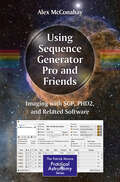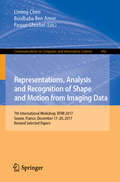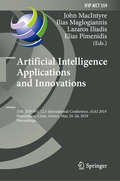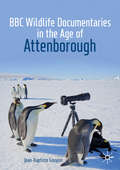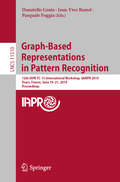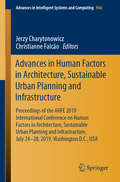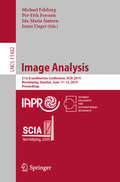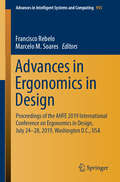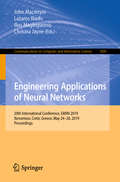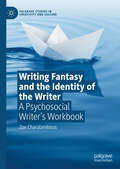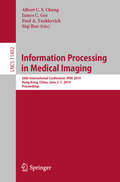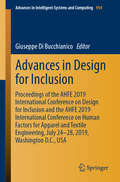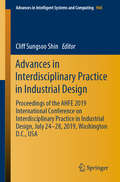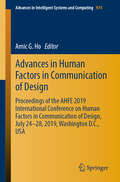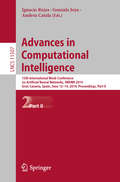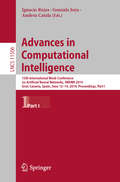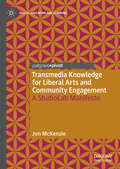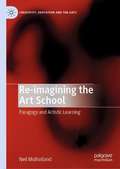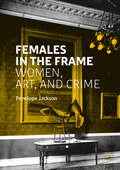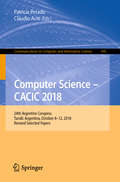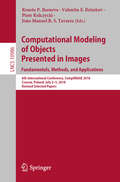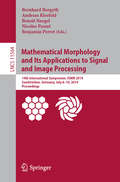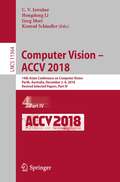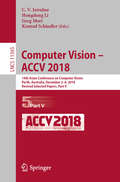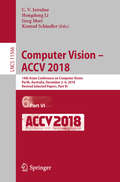- Table View
- List View
Using Sequence Generator Pro and Friends: Imaging with SGP, PHD2, and Related Software (The Patrick Moore Practical Astronomy Series)
by Alex McConahayThis guide is specifically aimed at those who are using—or want to use—Sequence Generator Pro. SGP is a “session management” software package that controls the telescope, mount, camera, and ancillary equipment to target and secure images during a night of imaging astronomical objects.The book begins with a special tutorial to get up and running with SGP. With a comprehensive reference section, it takes the user in detail through the various aspects of user and equipment profiles, equipment definitions, the sequencer, and other essential elements of SGP. Finally, it focuses on how to get the most out of the ancillary programs—target databases, autoguiders, plate solvers, planetarium software, and other applications.Oftentimes, technical guides can end up being far denser than the processes they intend to explain. Many of the insights provided by SGP expert Alex McConahay are beyond what can be found in the official program documentation. In this book, the reader will find in-depth, yet straightforward practical advice on how to automate nightly astroimaging sessions with Sequence Generator Pro.
Representations, Analysis and Recognition of Shape and Motion from Imaging Data: 7th International Workshop, RFMI 2017, Savoie, France, December 17–20, 2017, Revised Selected Papers (Communications in Computer and Information Science #842)
by Liming Chen Boulbaba Ben Amor Faouzi GhorbelThis book constitutes the refereed proceedings of the 7th International Workshop on Representations, Analysis and Recognition of Shape and Motion from Imaging Data, RFMI 2017, held in Savoi, France, in December 2017.The 8 revised full papers and 9 revised short papers presented were carefully reviewed and selected from 23 submissions. The papers are organized in topical sections on analyzing motion data; deep learning on image and shape data; 2D and 3D pattern classification; watermarking, segmentation and deformations.
Artificial Intelligence Applications and Innovations: 15th IFIP WG 12.5 International Conference, AIAI 2019, Hersonissos, Crete, Greece, May 24–26, 2019, Proceedings (IFIP Advances in Information and Communication Technology #559)
by Elias Pimenidis Lazaros Iliadis Ilias Maglogiannis John MacIntyreThis book constitutes the refereed proceedings of the 15th IFIP WG 12.5 International Conference on Artificial Intelligence Applications and Innovations, AIAI 2019, held in Hersonissos, Crete, Greece, in May 2019.The 49 full papers and 6 short papers presented were carefully reviewed and selected from 101 submissions. They cover a broad range of topics such as deep learning ANN; genetic algorithms - optimization; constraints modeling; ANN training algorithms; social media intelligent modeling; text mining/machine translation; fuzzy modeling; biomedical and bioinformatics algorithms and systems; feature selection; emotion recognition; hybrid Intelligent models; classification - pattern recognition; intelligent security modeling; complex stochastic games; unsupervised machine learning; ANN in industry; intelligent clustering; convolutional and recurrent ANN; recommender systems; intelligent telecommunications modeling; and intelligent hybrid systems using Internet of Things. The papers are organized in the following topical sections:AI anomaly detection - active learning; autonomous vehicles - aerial vehicles; biomedical AI; classification - clustering; constraint programming - brain inspired modeling; deep learning - convolutional ANN; fuzzy modeling; learning automata - logic based reasoning; machine learning - natural language; multi agent - IoT; nature inspired flight and robot; control - machine vision; and recommendation systems.
BBC Wildlife Documentaries in the Age of Attenborough (Palgrave Studies in Science and Popular Culture)
by Jean-Baptiste GouyonThis book explores the history of wildlife television in post-war Britain. It revolves around the role of David Attenborough, whose career as a broadcaster and natural history filmmaker has shaped British wildlife television. The book discusses aspects of Attenborough’s professional biography and also explores elements of the institutional history of the BBC—from the early 1960s, when it was at its most powerful, to the 2000s, when its future is uncertain. It focuses primarily on the wildlife ‘making-of’ documentary genre, which is used to trace how television progressively became a participant in the production of knowledge about nature. With the inclusion of analysis of television programmes, first-hand accounts, BBC archival material and, most notably, interviews with David Attenborough, this volume follows the development of the professional culture of wildlife broadcasting as it has been portrayed in public. It will be of interest to wildlife television amateurs, historians of British television and students in science communication.
Graph-Based Representations in Pattern Recognition: 12th IAPR-TC-15 International Workshop, GbRPR 2019, Tours, France, June 19–21, 2019, Proceedings (Lecture Notes in Computer Science #11510)
by Pasquale Foggia Donatello Conte Jean-Yves RamelThis book constitutes the refereed proceedings of the 12th IAPR-TC-15 International Workshop on Graph-Based Representation in Pattern Recognition, GbRPR 2019, held in Tours, France, in June 2019.The 22 full papers included in this volume together with an invited talk were carefully reviewed and selected from 28 submissions. The papers discuss research results and applications at the intersection of pattern recognition, image analysis, and graph theory. They cover topics such as graph edit distance, graph matching, machine learning for graph problems, network and graph embedding, spectral graph problems, and parallel algorithms for graph problems.
Advances in Human Factors in Architecture, Sustainable Urban Planning and Infrastructure: Proceedings of the AHFE 2019 International Conference on Human Factors in Architecture, Sustainable Urban Planning and Infrastructure, July 24-28, 2019, Washington D.C., USA (Advances in Intelligent Systems and Computing #966)
by Jerzy Charytonowicz Christianne FalcãoThis book discusses human factors research directed towards realizing and assessing sustainability in the built environment and architecture. It reports on advanced engineering methods for sustainable infrastructure design, architecture as well as on assessments of the efficient methods and the social, environmental, and economic impact of various designs and projects. The book covers a range of topics, including the use of recycled materials in architecture, ergonomics in buildings and public design, sustainable design for smart cities, design for the aging population, industrial design, human scale in architecture, and many more. Based on the AHFE 2019 International Conference on Human Factors in Architecture, Sustainable Urban Planning and Infrastructure, held on July 24-28, 2019, in Washington D.C., USA, it offers various perspectives on sustainability and ergonomics. As such, it is a valuable reference resource for designers, urban engineers, architects, infrastructure professionals, public infrastructure owners, policy makers, government engineers and planners, as well as operations managers and academics active in urban and infrastructure research.
Image Analysis: 21st Scandinavian Conference, SCIA 2019, Norrköping, Sweden, June 11–13, 2019, Proceedings (Lecture Notes in Computer Science #11482)
by Michael Felsberg Per-Erik Forssén Ida-Maria Sintorn Jonas UngerThis volume constitutes the refereed proceedings of the 21st Scandinavian Conference on Image Analysis, SCIA 2019, held in Norrköping, Sweden, in June 2019. The 40 revised papers presented were carefully reviewed and selected from 63 submissions. The contributions are structured in topical sections on Deep convolutional neural networks; Feature extraction and image analysis; Matching, tracking and geometry; and Medical and biomedical image analysis.
Advances in Ergonomics in Design: Proceedings of the AHFE 2019 International Conference on Ergonomics in Design, July 24-28, 2019, Washington D.C., USA (Advances in Intelligent Systems and Computing #955)
by Francisco Rebelo Marcelo M. SoaresThis book provides readers with a timely snapshot of ergonomics research and methods applied to the design, development and prototyping – as well as the evaluation, training and manufacturing – of products, systems and services. Combining theoretical contributions, case studies, and reports on technical interventions, it covers a wide range of topics in ergonomic design including: ecological design; cultural and ethical aspects in design; Interface design, user involvement and human–computer interaction in design; as well as design for accessibility and many others. The book particularly focuses on new technologies such as virtual reality, state-of-the-art methodologies in information design, and human–computer interfaces. Based on the AHFE 2019 International Conference on Ergonomics in Design, held on July 24-28, 2019, Washington D.C., USA, the book offers a timely guide for both researchers and design practitioners, including industrial designers, human–computer interaction and user experience researchers, production engineers and applied psychologists.
Engineering Applications of Neural Networks: 20th International Conference, EANN 2019, Xersonisos, Crete, Greece, May 24-26, 2019, Proceedings (Communications in Computer and Information Science #1000)
by Chrisina Jayne Lazaros Iliadis Ilias Maglogiannis John MacintyreThis book constitutes the refereed proceedings of the 19th International Conference on Engineering Applications of Neural Networks, EANN 2019, held in Xersonisos, Crete, Greece, in May 2019.The 35 revised full papers and 5 revised short papers presented were carefully reviewed and selected from 72 submissions. The papers are organized in topical sections on AI in energy management - industrial applications; biomedical - bioinformatics modeling; classification - learning; deep learning; deep learning - convolutional ANN; fuzzy - vulnerability - navigation modeling; machine learning modeling - optimization; ML - DL financial modeling; security - anomaly detection; 1st PEINT workshop.
Writing Fantasy and the Identity of the Writer: A Psychosocial Writer’s Workbook (Palgrave Studies in Creativity and Culture)
by Zoe CharalambousThis book presents the innovative pedagogy of Writing Fantasy: a method for exploring and shifting one’s identity as a writer. The book draws on qualitative research with undergraduate creative writing students and fills a gap in the literature exploring creative writing pedagogy and creative writing exercises. Based on the potential to shift writer identity through creative writing exercises and the common ground that these share with the stance of the Lacanian analyst, the author provides a set of guidelines, exercises and case studies to trace writing fantasy, evidenced in one’s creative writing texts and responses about creative writing. This innovative work offers fresh insights for scholars of creativity, Lacan and psychosocial studies, and a valuable new resource for students and teachers of creative writing.
Information Processing in Medical Imaging: 26th International Conference, IPMI 2019, Hong Kong, China, June 2–7, 2019, Proceedings (Lecture Notes in Computer Science #11492)
by James C. Gee Paul A. Yushkevich Siqi Bao Albert C. ChungThis book constitutes the proceedings of the 26th International Conference on Information Processing in Medical Imaging, IPMI 2019, held at the Hong Kong University of Science and Technology, Hong Kong, China, in June 2019. The 69 full papers presented in this volume were carefully reviewed and selected from 229 submissions. They were organized in topical sections on deep learning and segmentation; classification and inference; reconstruction; disease modeling; shape, registration; learning motion; functional imaging; and white matter imaging. The book also includes a number of post papers.
Advances in Design for Inclusion: Proceedings of the AHFE 2019 International Conference on Design for Inclusion and the AHFE 2019 International Conference on Human Factors for Apparel and Textile Engineering, July 24-28, 2019, Washington D.C., USA (Advances in Intelligent Systems and Computing #954)
by Giuseppe Di BucchianicoThis book addresses a range of topics in design, such as universal design; design for all; digital inclusion; universal usability; and accessibility of technologies regardless of users’ age, financial situation, education, geographic location, culture and language. It especially focuses on accessibility for people with auditory, cognitive, neurological, and visual impairments, ageing populations, and mobility for those with special physical needs. The book explores some of the overlaps between inclusive design and web accessibility to help managers, designers, developers, policy makers, and researchers optimize their efforts in these areas. Based on the AHFE 2019 International Conference on Design for Inclusion, held on July 24-28, held in Washington D.C., USA, it discusses new design technologies and highlights the disparate needs of the individuals within a community. Thanks to its multidisciplinary approach, it provides readers with various backgrounds with a timely, practice-oriented guide to design for inclusion.
Advances in Interdisciplinary Practice in Industrial Design: Proceedings of the AHFE 2019 International Conference on Interdisciplinary Practice in Industrial Design, July 24-28, 2019, Washington D.C., USA (Advances in Intelligent Systems and Computing #968)
by Cliff Sungsoo ShinThis book provides readers with a snapshot of cutting-edge methods and procedures in industrial design, with a particular focus on human-centered and user-experience design, service design, sustainable design and applications of virtual & augmented reality. Reporting on both theoretical and practical investigations aimed at improving industrial design through interdisciplinary collaboration, it covers a wide range of topics – from design strategies to product research and planning, exhibit design, as well as new materials and color research. Based on the AHFE 2019 International Conference on Interdisciplinary Practice in Industrial Design, held on July 24–28, 2019, Washington D.C., USA, the book offers a timely guide for industrial designers, production engineers and computer scientists.
Advances in Human Factors in Communication of Design: Proceedings of the AHFE 2019 International Conference on Human Factors in Communication of Design, July 24-28, 2019, Washington D.C., USA (Advances in Intelligent Systems and Computing #974)
by Amic G. HoThis book focuses on the emerging role of human factors in understanding, communicating with and engaging users. It reports on innovative approaches, highlighting visuals cues, such as new typographies, geometries and graphics for mobile and computer interfaces. The book also covers image and video processing, user-focused data compression, generative visuals, computational photography, and interactive design. Further topics include creative and empathetic design, human touch in digital graphics and experiential graphics. Based on the AHFE 2019 International Conference on Human Factors in Communication of Design, held on July 24-28, 2019, in Washington D.C., USA, this book reports on new findings, best-practices and case studies, providing readers with a fresh perspective and novel insights into the applications of human factors for enhancing the communication of design to users.
Advances in Computational Intelligence: 15th International Work-Conference on Artificial Neural Networks, IWANN 2019, Gran Canaria, Spain, June 12-14, 2019, Proceedings, Part II (Lecture Notes in Computer Science #11507)
by Ignacio Rojas Gonzalo Joya Andreu CatalaThis two-volume set LNCS 10305 and LNCS 10306 constitutes the refereed proceedings of the 15th International Work-Conference on Artificial Neural Networks, IWANN 2019, held at Gran Canaria, Spain, in June 2019.The 150 revised full papers presented in this two-volume set were carefully reviewed and selected from 210 submissions. The papers are organized in topical sections on machine learning in weather observation and forecasting; computational intelligence methods for time series; human activity recognition; new and future tendencies in brain-computer interface systems; random-weights neural networks; pattern recognition; deep learning and natural language processing; software testing and intelligent systems; data-driven intelligent transportation systems; deep learning models in healthcare and biomedicine; deep learning beyond convolution; artificial neural network for biomedical image processing; machine learning in vision and robotics; system identification, process control, and manufacturing; image and signal processing; soft computing; mathematics for neural networks; internet modeling, communication and networking; expert systems; evolutionary and genetic algorithms; advances in computational intelligence; computational biology and bioinformatics.
Advances in Computational Intelligence: 15th International Work-Conference on Artificial Neural Networks, IWANN 2019, Gran Canaria, Spain, June 12-14, 2019, Proceedings, Part I (Lecture Notes in Computer Science #11506)
by Ignacio Rojas Gonzalo Joya Andreu CatalaThis two-volume set LNCS 10305 and LNCS 10306 constitutes the refereed proceedings of the 15th International Work-Conference on Artificial Neural Networks, IWANN 2019, held at Gran Canaria, Spain, in June 2019.The 150 revised full papers presented in this two-volume set were carefully reviewed and selected from 210 submissions. The papers are organized in topical sections on machine learning in weather observation and forecasting; computational intelligence methods for time series; human activity recognition; new and future tendencies in brain-computer interface systems; random-weights neural networks; pattern recognition; deep learning and natural language processing; software testing and intelligent systems; data-driven intelligent transportation systems; deep learning models in healthcare and biomedicine; deep learning beyond convolution; artificial neural network for biomedical image processing; machine learning in vision and robotics; system identification, process control, and manufacturing; image and signal processing; soft computing; mathematics for neural networks; internet modeling, communication and networking; expert systems; evolutionary and genetic algorithms; advances in computational intelligence; computational biology and bioinformatics.
Transmedia Knowledge for Liberal Arts and Community Engagement: A StudioLab Manifesto (Digital Education and Learning)
by Jon McKenzieThis book sets forth a pedagogy for renewing the liberal arts by combining critical thinking, media activism, and design thinking. Using the StudioLab approach, the author seeks to democratize the social and technical practices of digital culture just as nineteenth century education sought to democratize literacy. This production of transmedia knowledge—from texts and videos to comics and installations—moves students between seminar, studio, lab, and field activities. The book also wrestles with the figure of Plato and the very medium of knowledge to re-envision higher education in contemporary societies, issuing a call for community engagement as a form of collective thought-action.
Re-imagining the Art School: Paragogy and Artistic Learning (Creativity, Education and the Arts)
by Neil MulhollandThis book proposes ‘paragogic’ methods to re-imagine the art academy. While art schooling was revolutionised in the early 20th century by the Bauhaus, the author argues that many art schools are unwittingly recycling the same modernist pedagogical fashions. Stagnating in such traditions, today’s art schools are blind to recent advances in the scholarship of teaching and learning. As discipline-based education research in art eternally battles the perceived threat of epistemicide, transformative educational practices are rapidly overcoming the perennialism of the art school. The author develops critical case studies of open source and peer-to-peer methods for re-imagining the art academy (para-academia) and andragogy (paragogy). This innovative book will be of interest and value to students and scholars of the art school, as well as how the art academy can be reimagined and rebuilt.
Females in the Frame: Women, Art, and Crime
by Penelope JacksonThis book explores the untold history of women, art, and crime. It has long been widely accepted that women have not played an active role in the art crime world, or if they have, it has been the part of the victim or peacemaker. Women, Art, and Crime overturns this understanding, as it investigates the female criminals who have destroyed, vandalised, stolen, and forged art, as well as those who have conned clients and committed white-collar crimes in their professional occupations in museums, libraries, and galleries. Whether prompted by a desire for revenge, for money, the instinct to protect a loved one, or simply as an act of quality control, this book delves into the various motivations and circumstances of women art criminals from a wide range of countries, including the UK, the USA, New Zealand, Romania, Germany, and France. Through a consideration of how we have come to perceive art crime and the gendered language associated with its documentation, this pioneering study questions why women have been left out of the discourse to date and how, by looking specifically at women, we can gain a more complete picture of art crime history.
Computer Science – CACIC 2018: 24th Argentine Congress, Tandil, Argentina, October 8–12, 2018, Revised Selected Papers (Communications in Computer and Information Science #995)
by Patricia Pesado Claudio AcitiThis book constitutes revised selected papers from the 24th Argentine Congress on Computer Science, CACIC 2018, held in Tandil, Argentina, in October 2018. The 26 papers presented in this volume were carefully reviewed and selected from a total of 155 submissions. They were organized in topical sections named: Agents and Systems; Distributed and Parallel Processing; Technology Applied to Education; Graphic Computation, Images and Visualization; Software Engineering; Databases and Data Mining; Hardware Architectures, Networks, and Operating Systems; Innovation in Software Systems; Signal Processing and Real-Time Systems; Computer Security; Innovation in Computer Science Education; and Digital Governance and Smart Cities.
Computational Modeling of Objects Presented in Images. Fundamentals, Methods, and Applications: 6th International Conference, CompIMAGE 2018, Cracow, Poland, July 2–5, 2018, Revised Selected Papers (Lecture Notes in Computer Science #10986)
by Reneta P. Barneva Valentin E. Brimkov Piotr Kulczycki João Manuel TavaresThis book constitutes the refereed post-conference proceedings of the 6th International Symposium on Computational Modeling of Objects Presented in Images, CompIMAGE 2018, held in Cracow, Poland, inJuly 2018.The 16 revised full papers presented in this book were carefully reviewed and selected from 30 submissions. The papers cover the following topics: digital geometry; digital tomography; and methods and applications.
Mathematical Morphology and Its Applications to Signal and Image Processing: 14th International Symposium, ISMM 2019, Saarbrücken, Germany, July 8-10, 2019, Proceedings (Lecture Notes in Computer Science #11564)
by Bernhard Burgeth Andreas Kleefeld Benoît Naegel Nicolas Passat Benjamin PerretThis book contains the refereed proceedings of the 14th International Symposium on Mathematical Morphology, ISMM 2019, held in Saarbrücken, Germany, in July 2019. The 40 revised full papers presented together with one invited talk were carefully reviewed and selected from 54 submissions. The papers are organized in topical sections on Theory, Discrete Topology and Tomography, Trees and Hierarchies, Multivariate Morphology, Computational Morphology, Machine Learning, Segmentation, Applications in Engineering, and Applications in (Bio)medical Imaging.
Computer Vision – ACCV 2018: 14th Asian Conference on Computer Vision, Perth, Australia, December 2–6, 2018, Revised Selected Papers, Part IV (Lecture Notes in Computer Science #11364)
by C. V. Jawahar Hongdong Li Greg Mori Konrad SchindlerThe six volume set LNCS 11361-11366 constitutes the proceedings of the 14th Asian Conference on Computer Vision, ACCV 2018, held in Perth, Australia, in December 2018. The total of 274 contributions was carefully reviewed and selected from 979 submissions during two rounds of reviewing and improvement. The papers focus on motion and tracking, segmentation and grouping, image-based modeling, dep learning, object recognition object recognition, object detection and categorization, vision and language, video analysis and event recognition, face and gesture analysis, statistical methods and learning, performance evaluation, medical image analysis, document analysis, optimization methods, RGBD and depth camera processing, robotic vision, applications of computer vision.
Computer Vision – ACCV 2018: 14th Asian Conference on Computer Vision, Perth, Australia, December 2–6, 2018, Revised Selected Papers, Part V (Lecture Notes in Computer Science #11365)
by C. V. Jawahar Hongdong Li Greg Mori Konrad SchindlerThe six volume set LNCS 11361-11366 constitutes the proceedings of the 14th Asian Conference on Computer Vision, ACCV 2018, held in Perth, Australia, in December 2018. The total of 274 contributions was carefully reviewed and selected from 979 submissions during two rounds of reviewing and improvement. The papers focus on motion and tracking, segmentation and grouping, image-based modeling, dep learning, object recognition object recognition, object detection and categorization, vision and language, video analysis and event recognition, face and gesture analysis, statistical methods and learning, performance evaluation, medical image analysis, document analysis, optimization methods, RGBD and depth camera processing, robotic vision, applications of computer vision.
Computer Vision – ACCV 2018: 14th Asian Conference on Computer Vision, Perth, Australia, December 2–6, 2018, Revised Selected Papers, Part VI (Lecture Notes in Computer Science #11366)
by C. V. Jawahar Hongdong Li Greg Mori Konrad SchindlerThe six volume set LNCS 11361-11366 constitutes the proceedings of the 14th Asian Conference on Computer Vision, ACCV 2018, held in Perth, Australia, in December 2018. The total of 274 contributions was carefully reviewed and selected from 979 submissions during two rounds of reviewing and improvement. The papers focus on motion and tracking, segmentation and grouping, image-based modeling, dep learning, object recognition object recognition, object detection and categorization, vision and language, video analysis and event recognition, face and gesture analysis, statistical methods and learning, performance evaluation, medical image analysis, document analysis, optimization methods, RGBD and depth camera processing, robotic vision, applications of computer vision.
